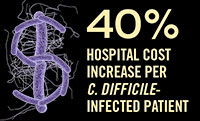 |
Clostridium difficile increases hospital costs by 40 percent for each infected person and puts each at higher risk for a longer hospital stay and readmission, according to a study published in the American Journal of Infection Control.
The study, “Impact of Clostridium difficile-associated diarrhea on acute care length of stay, hospital costs and readmission,” analyzed patients discharged between January 2009 and December 2011. An analysis of inpatient hospital data was performed on 171,586 eligible discharges from approximately 500 U.S. hospitals in the Premier Research Services health care database.
The study was conducted by group purchasing organization Premier Inc., Charlotte, N.C., and Cubist Pharmaceuticals, which recently was acquired by Merck & Co. Inc.
Results showed that C. difficile contributed to an increase of approximately 40 percent in costs per case or an average of $7,285 more for each infected patient. Costs were higher for patients with renal impairment ($8,942), immunocompromised status ($8,692) and concomitant antibiotic exposure ($8,545).
In addition, compared against patients without C. difficile, those infected experienced an estimated 77 percent higher chance of being readmitted within 30 days, 55 percent higher risk of a longer hospital stay of nearly five days and 13 percent higher risk of mortality.
“In the last 15 years, C. difficile hospitalizations have increased by more than 200 percent,” says Glenn Magee, lead author of the study and principal research scientist at Premier. Premier officials say it is the first study to provide an in-depth look at the impact of C. difficile on U.S. hospitals.
According to the Centers for Disease Control and Prevention (CDC), each year an estimated 500,000 patients contract C. difficile, which can lead to severe diarrhea, pseudomembranous colitis, toxic megacolon and death in extreme cases.
Although there is little research on the financial cost and impact of C. difficile-related infections to the health care system, estimates are about $5 billion annually, according to Premier.
Health care providers have significantly reduced C. difficile transmission and control outbreaks by implementing an array of infection prevention strategies, including the use of barrier precautions with gloves and gowns and a private room, if possible, Premier states.
Other effective C. difficile strategies include strict adherence to hand washing, dedicated patient care items and equipment, and thorough environmental cleaning and decontamination of patient rooms. // By Jeff Ferenc





